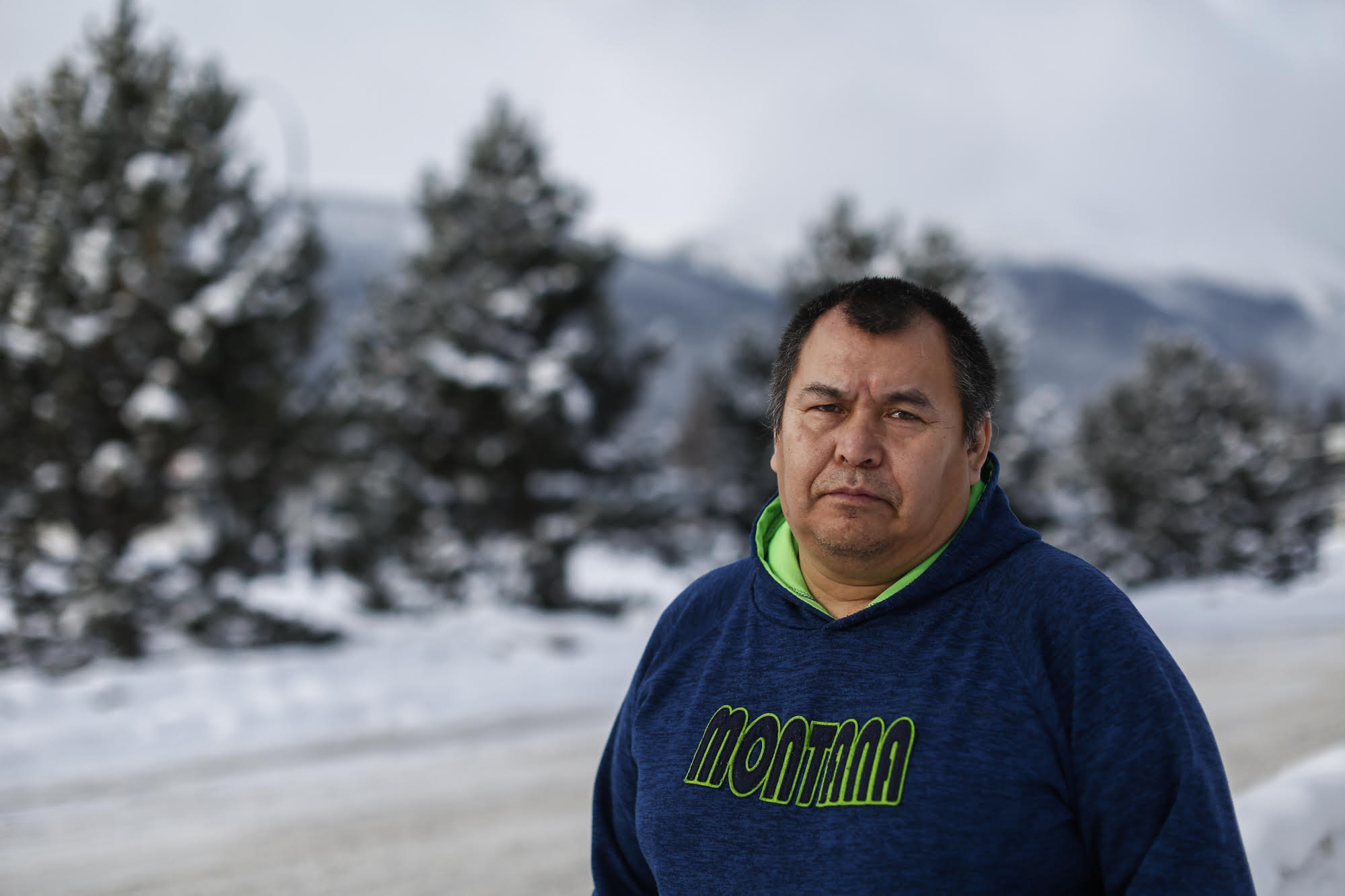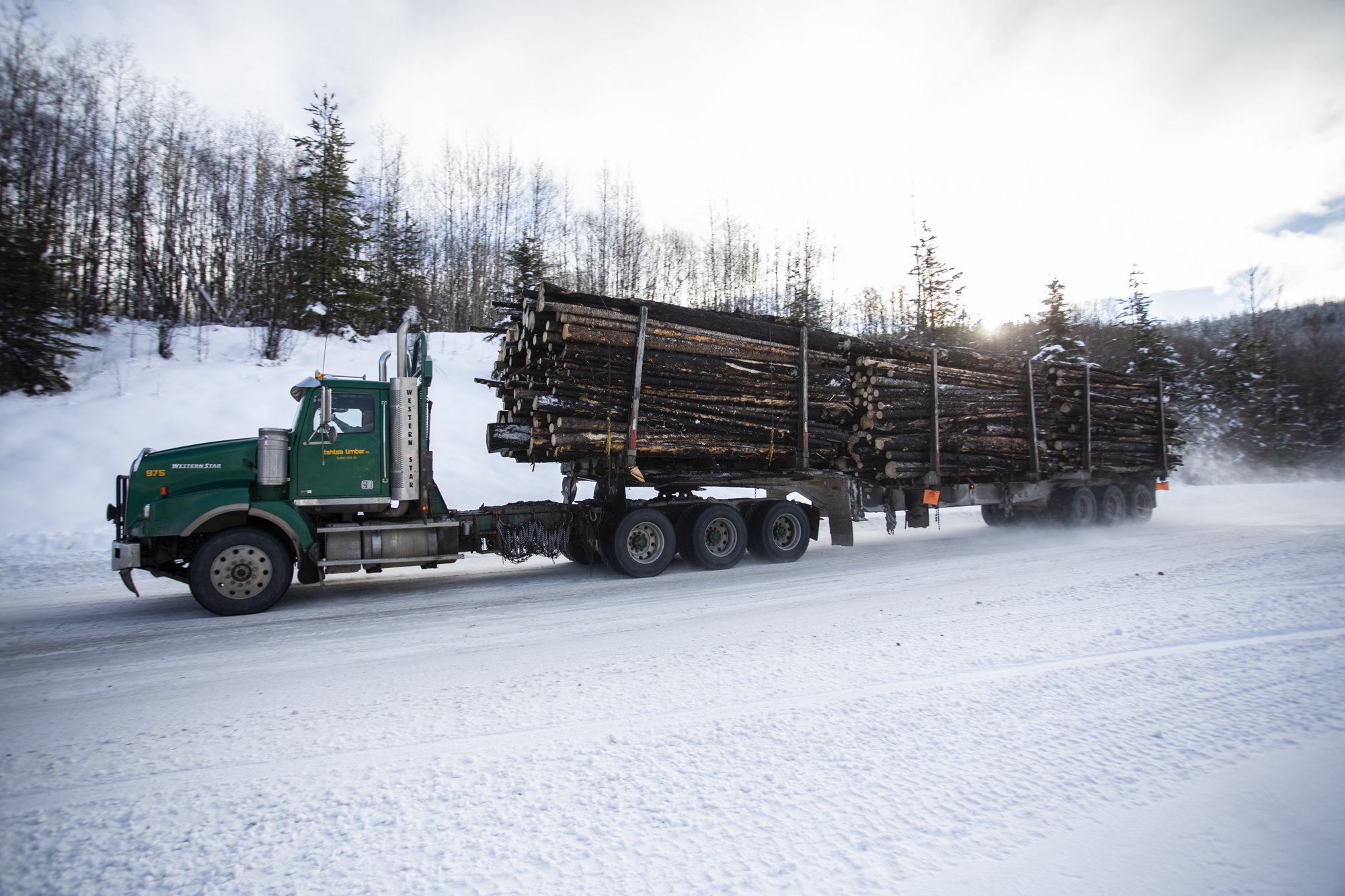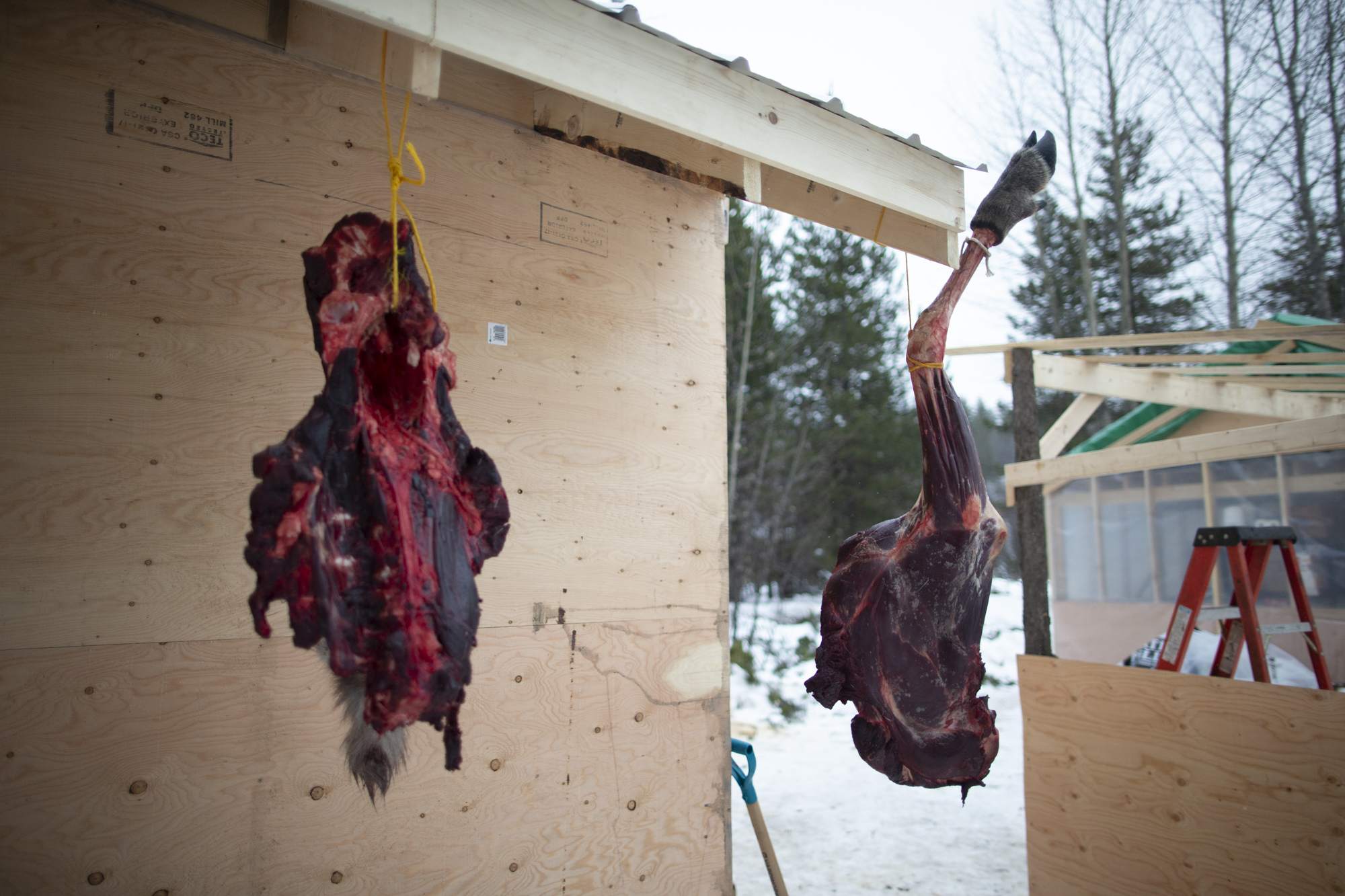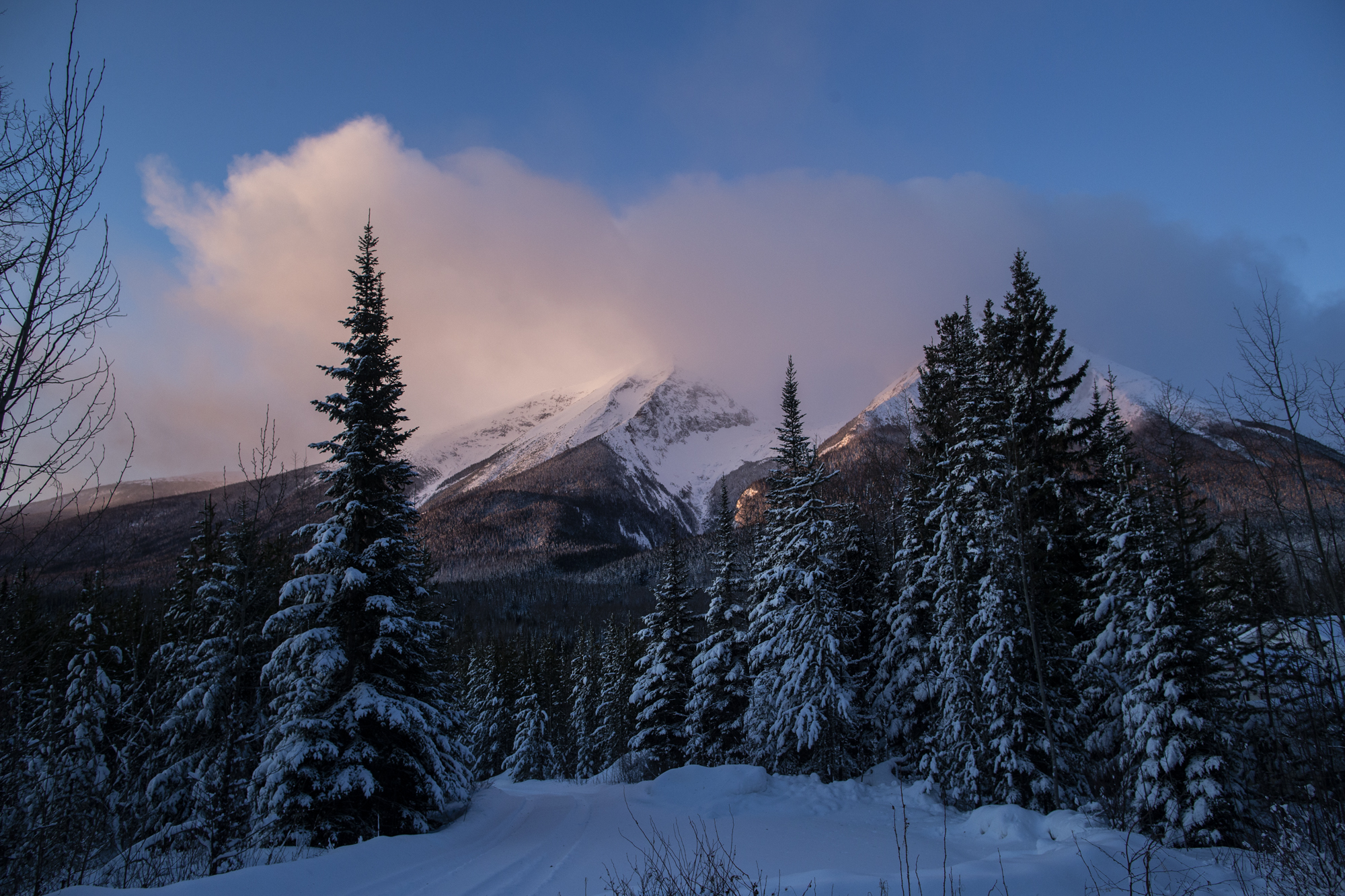On a recent Sunday morning, 10 RCMP officers downed breakfasts at a long table at Lousie’s Kitchen diner in Smithers, B.C., their beige Division Liaison Team shirts stretched tight across their chests.
Next to them sat a table full of industry workers, with fluorescent orange safety shirts and battered steel-toed boots. Behind them was a table of Wet’suwet’en nation members and elders.
Videos by VICE
While conversations about the standoff between the RCMP and the Wet’suwet’en hereditary chiefs over a $6.6 billion natural gas pipeline through traditional territory percolated around the diner, almost no one was willing to speak publicly about it—even though surely most of them knew what was about to happen. Over the weekend close to 100 additional RCMP officers had moved into the area.
“I hope they find some sort of resolution,” said one of the waitresses, in passing. “It’s been going on for so long.”
Days later, on February 6, militarized RCMP backed up with dog teams and surveillance drones raided anti-pipeline camps barely an hour’s drive from the diner.
In all nearly 30 people were arrested in the area, sparking protests and dozens more arrests across the country. A week after tactical officers in army fatigues moved in and threatened journalists with arrest, supporters continue to block highways and train tracks all over Canada.
But as police wind down enforcement action this week, the dividing lines of this decadelong conflict are running deeper than ever before—though not necessarily in the ways the rest of Canada might think.

Just beyond the barricades is a region of B.C. that upholds many contrasts: it’s historically supported by industry, but has successfully shut down major resource projects. Traditional Wet’suwet’en governance is in the spotlight now, but has faced hard questions about stripping titles from chiefs. With so much at stake, a culture of silence and distrust has set in, compounded by a political apparatus meant to divide.
Some businesses, like a local truck rental company, are vocal about their support for the pipeline, going so far as to build an illuminated “LNG Canada” sign next to the highway through Smithers, cheering on the liquified natural gas industry.
Other companies are taking pains to stay out of the spotlight, with some anti-pipeline activists attempting to name and shame businesses that accept contracts with the RCMP or Coastal GasLink.
Coastal GasLink says the pipeline will create upwards of 2,000 jobs across the region during the four-year construction phase and 16-35 permanent positions once the pipeline is complete. The project has signed benefit agreements with four of the Wet’suwet’en elected band councils.
A company report issued in December says it had awarded $825 million so far in contracts to Indigenous businesses.

Philip Tait Jr. has one of those jobs, and says it’s vital to support his family.
Tait works driving a haul truck for Khya Resources Ltd., which is owned by Witset First Nation and Moricetown Band Development Corporation. Tait said the company is currently working to haul rock and help build the right-of-way and access road for the pipeline.
He used to work in the forest industry, he said, but with the downturn in that industry he left hoping for better prospects with the pipeline contracts.
“I was barely making it,” Tait said. “I just couldn’t stay there, cause I just wasn’t making enough.
“On the reserves, there’s hardly any jobs. The job prospects are really low because a lot of them don’t get training,” he said. “Now I’m getting the training and the knowledge of these other machines that are really needed on other projects here too.”
Tait doesn’t often speak up about his work for the pipeline, in part because of how vicious some of the backlash has been. He said years ago when the conflict first started, people’s cars would get vandalized if they spoke out in favour of the pipeline project.

“On social media, if you’re against (the hereditary chiefs) their supporters jump right on you. Right from the beginning I’ve said I’m going to say my piece and I’m not going to be bullied,” he said.
In the years the conflict has dragged on, some hereditary chiefs have been stripped of their titles for supporting the pipeline. The hereditary chiefs opposed to the pipeline say the band councils that have signed onto it only have jurisdiction over the reserve lands, not the much broader traditional territories.
The band councils-vs-hereditary-chiefs narrative is a tempting one to hew to, but experts say it obscures the larger implications of the conflict and its roots in colonial history.
As University of Victoria professor Brian Thom explained, division among the leadership of Indigenous communities isn’t an accident: it’s colonial policies achieving what they were designed to do.
“The roots are in the Indian Act, and how the federal government created a system of Indian bands and reserves as a way to efficiently administer ‘the Indians,’” Thom said.
“It’s a well-known tool that was used and perpetuated and we still have today to facilitate the removal of Indigenous people from their lands,” he said.
The CGL pipeline is also far from the first time battle lines have been drawn here over proposed industry projects.

This region is, after all, heavily reliant on the resource industry as an economic driver. Dozens of mining and industry supply companies have offices here. Forestry is a huge employer, and as local MP Taylor Bachrach explained, tourism is rapidly becoming a keystone industry as well.
“The Bulkley Valley is home to some of the best steelhead fishing in the world,” Bachrach said. “There’s more and more ski and mountain bike tourism, and as the word gets out there’s also a fair amount of rubber tire traffic, especially from the United States, people heading on the way up to Alaska.”
The Bulkley-Nechako region also has a long history of successfully blocking projects it didn’t want.
This is where the Northern Gateway pipeline died, and where Shell was forced to abandon plans of fracking near the headwaters of the Skeena River. In 2008 the B.C. government placed a moratorium on open-net fish farming along the province’s north coast, thanks in large part to a united grassroots fight here in the Bulkley Valley, which relies on its salmon-bearing rivers.
Every fight that’s been fought and won succeeded because they brought people together, according to Bachrach.
“The health of the river and the health of wild salmon is one of those things that we’ve seen as a real unifier in the Northwest,” Bachrach said.
Bachrach said the region has a long record of grappling with contentious development proposals, and finding solutions.

In the 80s and 90s there were tense conflicts around the forestry industry. There were roadblocks similar to the Wet’suwet’en blockades. But Bachrach said the region managed to solve those disputes through a joint land-use planning process. Today, logging trucks roll unimpeded through Wet’suwet’en territory with the support of the nation.
Dolly Alfred and her mother Sue remember all those battles as well, especially the most important one. Dolly’s father was Chief Ut’akhgit (also known as Henry Alfred), a hereditary chief of the Laksilyu clan.
Before his death in September 2018, he was the last-surviving plaintiff in the landmark Delgamuukw-Gisday’wa case, when the Supreme Court of Canada recognized existence of the Gitxsan and Wet’suwet’en hereditary chiefs’ governance over their unceded traditional territory.
Dolly said that case alone is proof that there is far more that unites this region than divides it.
Sue remembers growing up on the land more than 80 years ago, hunting and trapping in the winter, or picking berries and fishing in the summertime.
“Our history here is huge,” she said. “It goes back thousands of years.”

Central to that history is the hereditary chief system of governance, and the feast halls which, for thousands of years, have been a place to talk through disagreements until consensus is achieved.
Sue, whose traditional name is Wil’at, which means Echo Across the Valley in Wet’suwet’en, grew up in those feast halls. Beginning when she was 8 years old, she sat at her grandmother’s feet learning the language and the history that binds the Wet’suwet’en nation and its clans.
The conflict that’s happening today is an outgrowth of colonialism and the residential school system that she and thousands of other Wet’suwet’en children were forced into, Sue said.
Sitting at the kitchen table in her home on the Witset First Nation reserve, she recalled being strapped by residential school nuns for simply speaking her own language.
A generation later her daughter Dolly attended a Catholic school in Smithers. She still has scars from the strap across the palms of her hands, delivered for committing the same offence.
Today fewer than 3 percent of the nation can still speak Wet’suwet’en fluently, Sue said.
It’s painful for Sue to see what’s happening today, in part because of its impact on her work trying to rebuild Wet’suwet’en language and culture.

Now in her 80s, Sue is the president of the Wet’suwet’en Language and Culture Society, which is working to create an exhaustive Wet’suwet’en language dictionary. And Dolly, with her mother’s guidance, has built a strong following with Wet’suwet’en Wednesdays—a video series where she teaches words and phrases from her language.
Weakening the language was meant to undermine the power of Wet’suwet’en culture and governance structures, which is exactly what colonial policies intended, Sue said.
At the same time, the federal government imposed the elected Indian Act band council system on Indigenous nations across the country, and relocated whole communities onto arbitrarily defined reserves, she said.
Clifford Atleo is a professor at Simon Fraser University, and an expert on the intersection of Indigenous governance and resource development.
He said while many Indigenous nations in Canada have hundreds of years worth of dealing and surviving settler-imposed structures, the situation in British Columbia is much more recent.
“In the 1920s is when you started to see (colonialism) really start to take a grip. It was around 1927 when the potlatch was banned, when the government banned the hiring of lawyers, banned gathering in crowds,” Atleo said. “A lot of things had to go underground.”
But those practices are making a resurgence across the country, and creating a new push for Canada to actually reconcile colonial laws with Indigenous ones.

In January, Canada’s former top lawmaker weighed in, saying consulting with local band offices on projects like Coastal GasLink isn’t good enough. Jody Wilson-Raybould, who now sits as an independent, wrote in the Globe and Mail that governments should be doing more to encourage nation- and governance-building outside the band system.
“We have to deconstruct the colonial reality,” Wilson-Raybould wrote. “This includes clarifying the role of hereditary chiefs and systems in today’s world.”
The Wet’suwet’en are trying to do exactly that. The Office of the Wet’suwet’en Hereditary Chiefs has been working to translate the nation’s own constitution from oral history, and to get it down on paper. But as Wilson-Raybould pointed out, conflicts like the pipeline dispute are getting in the way.
“The pipeline conflict is a stark reminder that we have not moved with enough urgency or clarity in advancing this transition,” Wilson-Raybould wrote.
Like all the resource battles of the past, the Wet’suwet’en are also no strangers to the RCMP on their territory.
“My grandma used to tell me about when they were living out at NelhDzi’ Tazli,” Sue said. “The RCMP came and said, ‘You can’t live in this house anymore.’”
“They got chased off their homestead, their territory,” Sue said. “Grandma told me that story, and she cried and cried.”
The whole family was forced to relocate—by foot—from near Houston, B.C., to an area 100 kilometres away closer to Smithers. When they arrived, they started clearing land and building a new log home, Sue said.
But the police and government agents came again, and relocated the family a second time to a place now called Telkwa High Road.
“This is not the first time the RCMP are coming onto our territory,” she said. “It’s a story I’ve carried my whole life. It’s still happening.”
Follow Jesse Winter on Twitter.




